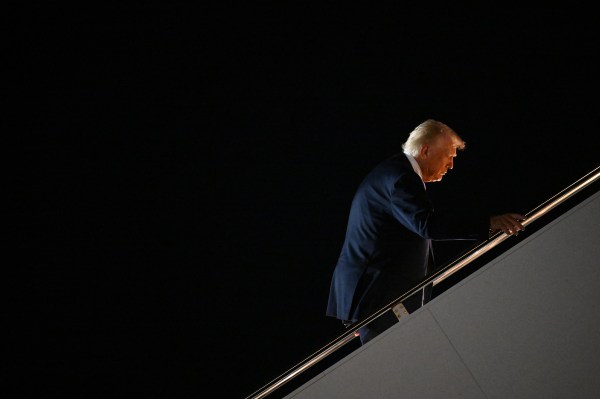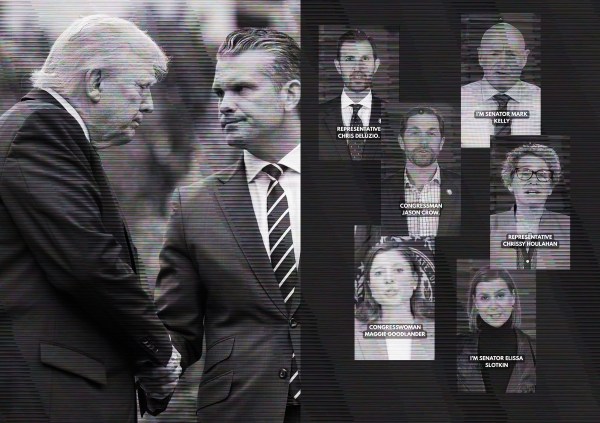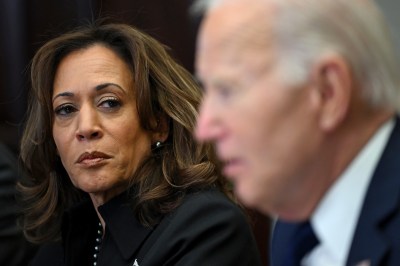Turn any article into a podcast. Upgrade now to start listening.
Premium Members can share articles with friends & family to bypass the paywall.
In sports, coaches of losing teams that put up a valiant effort to tighten the score at the end of the game are fond of saying: “We didn’t lose; we just ran out of time.” That is, in effect, the message of Kamala Harris’s book 107 Days, her memoir of the shortest presidential general election campaign in history.
“One hundred and seven days were not, in the end, long enough to accomplish the task of winning the presidency,” Harris concludes in the closing pages of the book, published on September 23.
But based on Harris’ own recounting of the 2024 campaign, it’s hard for the reader to share the conclusion that lack of time was the primary cause, or even a leading cause, of her defeat.
Over the course of 310 pages, the book makes plain that the three top causes of her defeat were, in order of importance: 1) Harris was tied too closely to the deeply unpopular incumbent president; 2) her record was more progressive than that of the deeply unpopular incumbent Democrat; and 3) while she could hold her own in debates and scripted speeches, Harris was, and is, bad at giving interviews.
In 107 Days, Harris spins problem No. 1—her inability to create distance with President Joe Biden—in a couple different ways. At times, Harris confesses, she was just too darn loyal. At other times, she says, the problem was messaging.
On October 8, 2024, Harris was asked during an appearance on The View: “If anything, would you have done something differently than President Biden during the past four years?” Harris replied: “There is not a thing that comes to mind.”
“Why. Didn’t. I. Separate. Myself. From. Joe. Biden?” Harris writes in her memoir. “Over the course of the 107 days, I became increasingly aware that people wanted to know there was a separation and that it was a big issue for them. I just didn’t realize how big.”
In retrospect, Harris regrets that during her appearance on The View she had not first dished out her rehearsed line that unlike Biden, she would appoint a Republican to her Cabinet. While that answer would have provided less fodder for devastating Trump TV ads, it would not have helped her establish significant distance between herself and Biden.
Voters were not angry with Biden because he failed to appoint a Republican as transportation secretary. They were angry with Biden over inflation, immigration, and Afghanistan. It’s not clear how Biden’s own vice president could have persuasively distanced herself from him on those key issues if she tried. In March 2021, Harris cast the tie-breaking vote to advance a $2 trillion spending bill that former Democratic Treasury Secretary Larry Summers warned could “set off inflationary pressures of a kind we have not seen in a generation.”
There are other examples. “Harris says she had key role in Biden's Afghanistan withdrawal decision,” reads the headline of an April 2021 Politico story. That same month, Harris became what many referred to as Biden’s “border czar.”
In 107 Days, Harris continues to see her party’s immigration problem to be primarily one of messaging, not policy. She writes that she privately urged the White House to use the word “crisis” but only in the sense that the crisis was “a global one—to which we, America, always a beacon for the poor and the threatened, could not be, and were not, immune.” She blames the Biden White House for failing to push back against the claim that she was the “border czar” and clarify that she was really just tasked with addressing the “root causes” of illegal migration. She claims her efforts to address those root causes—such as helping to secure $5.2 billion in private investments from companies like Nespresso and Microsoft in Central America—were helping to stem the tide of migration, but the Biden camp failed to get that message out: “I shouldered the blame for the porous border, an issue that had proved intractable for Democratic and Republican administrations alike.” Harris does not address the fact that the number of illegal border crossings dramatically changed between administrations, and even during the Biden administration, in response to changing executive branch policies.
Ultimately, Harris blames Biden himself for the original sin of deciding to run again and regrets buying into the mantra that it was Biden’s decision alone to make: “I think it was recklessness. The stakes were simply too high. This wasn’t a choice that should have been left to an individual’s ego, an individual’s ambition. It should have been more than a personal decision.”
Given the stakes, was Harris’s own decision to grab the nomination reckless?
It’s a question that gets scant attention in 107 Days. The night of the Trump-Biden debate—when Trump was already on track to win—his campaign ran a TV ad with the tag line: “Vote Joe Biden today, get Kamala Harris tomorrow.” Former House Speaker Nancy Pelosi “had been blunt about preferring a mini primary after Joe stepped down,” Harris writes. But Harris prevented that from happening—in part by locking down the endorsement of party powerbrokers and Biden himself. Harris writes that when Biden initially called her to tell her he was dropping out of the presidential race, he was going to wait a day or two to endorse her. Harris thought that any gap between dropping out and endorsing would be disastrous for her, and she prevailed upon Biden to endorse her minutes after dropping out. “I also knew, as he did, that I was the only person who would preserve his legacy. At this point, anyone else was bound to throw him—and all the good he had achieved—right under the bus,” Harris writes on page 2. It’s a sentence that echoed in my mind on page 214, when Harris recounts her gaffe on The View when she declined to put daylight between herself and Biden out of loyalty. Afterward, Harris writes, campaign adviser David Plouffe felt he “needed to do an intervention with me, that I needed to get it through my head that this was a real issue. That was when he told me bluntly, ‘People hate Joe Biden.’”
Despite Harris’ unique vulnerability of being so closely tied to Biden, she never doubts that she was the strongest positioned to be the Democratic nominee. “I knew I had everything I needed to do this,” she writes. “With Joe’s endorsement and more name recognition than anyone else who might challenge, I had the strongest case. I’d also proven in the midterms that I could help flip seats. I had appeal for moderates and independents.”
But the reader is left wondering what the basis is for her claim of appeal to moderates and independents. In 2020, Harris had run to the left of Biden on issues ranging from energy and the Green New Deal to single-payer health care, saying at one point she would abolish private health insurance. Harris’s 2024 campaign backtracked on many, but not all, of her 2020 progressive policies, with hardly any explanation other than expediency. But Harris acknowledges in her book that Trump found a “winning message” by spending $40 million on ads highlighting her record on transgender rights.
A Trump ad highlighted popular radio host Charlemagne tha God saying “Kamala supports taxpayer-funded sex changes for prisoners,” then the ad concluded that “Kamala is for they/them. President Trump is for you.” In 107 Days, Harris defends her record on the issue by saying a right to transgender surgeries for prisoners was required by court decisions (ignoring the fact that she’s happy to campaign against court decisions when the issue was abortion) and by saying that she’s open to segregating sports teams based on factors like “muscle mass and unfair athletic advantage.” Harris writes that she never directly addressed the issue due to her instincts to protect people who identify as transgender. “I do not regret my decision to follow my protective instincts. I do regret not giving even more attention to how we might mitigate Trump’s attacks,” she writes.
Despite her progressive vulnerabilities, Harris opted for progressive darling Tim Walz, the governor of Minnesota, instead of the more moderate Pennsylvania Gov. Josh Shapiro, to serve as her running mate. In Harris’ telling, Shapiro seemed to feel entitled to the job and was too concerned about his own portfolio as vice president. “My senior staff, to a person, strongly favored Tim,” Harris writes. She later reveals that she was deeply disappointed with Walz’s performance in debate against J.D. Vance. “I told the television screen: ‘You’re not there to make friends with the guy who is attacking your running mate,” she writes.
Harris concludes that the VP debate had a “negligible” impact on the race, and Walz’s name does not appear in the book’s narrative again until Harris greets her running mate and his sobbing daughter just before her concession speech at Howard University.
As could be expected of the memoir of almost any politician, the ratio of news nuggets to navel-gazing in 107 Days is quite low. In the book, Harris spends too much time recounting her own internal monologue, name-checking friends and staffers for no discernible reason, and padding her résumé. An event on the campaign trail will remind her of meetings (that sound tedious to the reader) that she convened to try to pass Biden’s “Build Back Better” agenda. While recounting a speech delivered 104 days from the election to African American sorority alumni, Harris writes: “That day I was so pleased to see the young president of Phi Beta Sigma, Chris V. Rey, and the esteemed president of Delta Sigma Theta, Elsie Cooke-Holmes.” After that speech, Harris travels to Houston for a briefing on a Category 1 hurricane that hit Houston. “These kinds of briefings are sadly familiar to me. As DA, I’d witnessed the aftermath of Hurricane Katrina,” Harris writes, leaving the reader to wonder how exactly the district attorney of San Francisco would have any particular insight into a disaster that ravaged the Deep South.
But the book does include at least a handful of interesting anecdotes and revelations.
For example, Harris reveals that her two private interactions with Trump during the campaign were charming. The day after the lone and heated 2024 presidential debate, the candidates shook hands at a September 11 memorial. “You were great last night,” Trump told Harris, she writes. “I didn’t know what to say in return, except, ‘You, too.’” After the second attempted assassination of Trump (by a man who was convicted of that crime last week), Harris called Trump to check on him. “We’re all in this very precarious position being president or vice president. It’s dangerous, worse than race car drivers and bull riders,” Trump told Harris. “It’s very nice that you called, and I appreciate it. You’ve done a great job, you really have. You’ve done a very, very good job … my only problem is it makes it very hard for me to be angry at you. It’s like, what am I going to do? How do I say bad things about you now?” Harris squares Trump’s public viciousness toward her and private amiability by concluding: “He’s a con man. He’s really good at it.”
Harris also reveals that she would have chosen Biden Transportation Secretary and 2020 Democratic rival Pete Buttigieg to be her running mate if he were straight. In Harris’ telling, she feared the electorate was too biased to vote for a black woman and a gay man on the same ticket. “Pete Buttigieg was my first choice,” she writes. “He would have been an ideal partner—if I were a straight white man. But we were already asking a lot of America.”
In an appearance on MSNBC last week, Harris struggled to address that revelation from her own book. “To say he couldn’t be on the ticket, effectively because he’s gay, that’s hard to hear,” MSNBC host Rachel Maddow told Harris. “No, no, no, that’s not what I said,” Harris replied, before confirming that is effectively what she wrote. “My point as I write in the book is that I was clear that in 107 days, in one of the most hotly contested elections for the president of the United States against someone like Donald Trump who knows no floor, to be a black woman running for the president of the United States, and as a vice presidential running mate a gay man, with the stakes being so high, it made me very sad but it also made me realize it would be a real risk.”
And there it was, a reminder of Harris’ third biggest vulnerability. She’s still the same candidate for whom interviews are so difficult that she waited 39 days into her 107-day campaign to conduct her first interview, which she concedes in the book did not go well. The same Kamala Harris who botched her interview on The View. The same Kamala Harris with such a habit of spouting Veep-esque pablum that Trump preferred to run against Harris before Biden’s disastrous debate.
Despite Harris’s many flaws—and intra-party efforts to bury her political career—it seems like we haven’t heard the last of her. “So what do we do?” Harris asks at the end of 107 Days. “The answer will not come out of Washington, DC. Their immediate task is to win the midterms and restore some checks and balances on this unchecked and unbalanced president.” For anyone thinking these lines are a prelude to Harris announcing she will not run again, that hope is quickly dashed: “I’ll no longer sit in DC in the grandeur of the ceremonial office. I will be with the people, in towns and communities where I can listen to their ideas on how we rebuild trust, empathy, and a government worthy of the ideals of this country.”
In addition to her national listening tour, Harris leaves the door open to taking another shot at the presidency by emphasizing—and mischaracterizing—how close the 2024 presidential results were. “In the Blue Wall states that could have made me president, Trump beat me by just 0.86 percent in Wisconsin, 1.44 percent in Michigan, and 1.73 percent in Pennsylvania. Ours was the third-closest presidential election in a century,” Harris writes. It’s not clear how Harris is doing the math. If one is ranking presidential contests by how close the election was in the “tipping point state” that clinched a majority of votes for the winning candidate, then 2024 comes in as the seventh closest contest in a century. If one is ranking by share of votes in the Electoral College, Harris’s loss was the ninth closest in the past century—behind 2000, 2004, 1976, 1968, 1960, 2016, 2020, and 1948.
And yet, I wouldn’t count out Harris from winning the 2028 nomination or the presidency. Eighty-one million Americans did vote to make Harris vice president in 2020, and 75 million did vote to make her president in 2024.* Like Donald Trump and Richard Nixon before her, Kamala Harris would not be the first flawed candidate to win a presidential election after losing one.
Correction, October 2, 2025: This article has been updated to correct the year that Kamala Harris received 75 million votes for president.







Please note that we at The Dispatch hold ourselves, our work, and our commenters to a higher standard than other places on the internet. We welcome comments that foster genuine debate or discussion—including comments critical of us or our work—but responses that include ad hominem attacks on fellow Dispatch members or are intended to stoke fear and anger may be moderated.
With your membership, you only have the ability to comment on The Morning Dispatch articles. Consider upgrading to join the conversation everywhere.